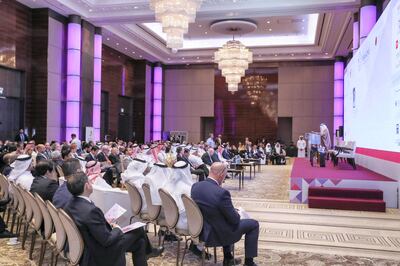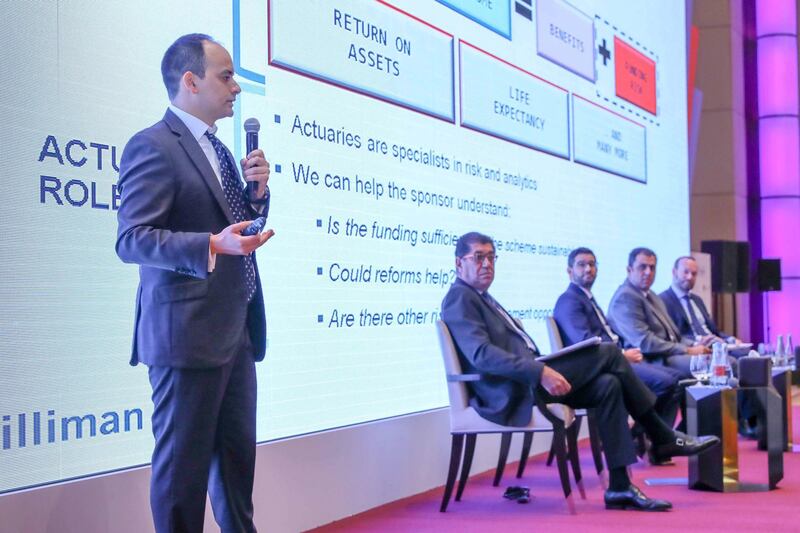Receiving an end-of-service benefit after leaving a job in the UAE is a moment all expatriate employees look forward to.
But with many considering it “a bonus” rather than a lump sum to be invested for the future, it can contribute to the retirement gap many expatriates face.
"The end of service gratuity is almost like a mid-career bonus and does not serve its function as a platform for retirement saving," Simon Herborn, senior consulting actuary at Milliman – Middle East and Africa, told The National on the sidelines of the recent Mena Pensions Conference in Manama, Bahrain.
This is because the end-of-service benefit does not take into account the lifespan of the employee when they leave the company – only the years they have worked there.
This causes problems for expats when they later return home for their retirement days, as they do not have the generous pension systems in their home countries that are seen in the GCC.
“It’s very problematic,” says Martin McGuigan, a partner at Aon Retirement Solutions and McLagan in Dubai. “People think they are only here for two or three years and think they will worry about that when they get home. But the UAE is a great place to live and they end up staying."
By law all UAE employees receive an end of service benefit, commonly referred to as a gratuity, when they leave their firm. However, the benefit has received criticism in the past for being an inadequate method for residents to save for retirement as it is calculated on an employee’s base salary. Emiratis, on the other hand, have their retirement needs met by a defined benefit scheme, which pays out a percentage of an individual’s final salary for the rest of their life.
At the Mena Pensions Conference, hosted by Takaud - a Bahrain provider of savings investment and pension solutions, analysts said the generous policies for the GCC citizens have sustainability challenges in the long-term due to ageing populations. They also believe the gratuity – a defined benefit scheme as well – requires an overhaul to ensure it not only adequately funds a person's retirement needs but also that companies have the money set aside to pay out.
In a YouGov poll of 1,000 UAE expats in full-time employment, commissioned by Zurich and Mercer in 2017, eight in 10 said the gratuity payment was not enough to cover their retirement expenses, while 78 per cent said their employer should do more to help them prepare for their financial future.
_________
Read more:
The GCC’s pension systems are ripe for reform
Is the UAE's new five-year visa a game changer for expat retirement?
85% of UAE residents still not saving enough for their future: National Bonds
[ Improving financial literacy in the UAE still needs attention ]
__________
So what is the alternative? At the Mena Pensions Conference, delegates discussed how the region’s pension systems may evolve from a defined benefit – a guaranteed payment until death - to a defined contribution scheme that places the onus on the individual to save for their future.
Salmaan Jaffery, chief business development officer at Dubai International Financial Centre, says there will be a defined contribution-based plan for expats “in the near future … with some kind of transitional phase to move people away from their existing defined benefit to defined contribution scheme”.
According to experts, the Dubai International Financial Centre is already consulting on a proposal to change the current system.
“There is an interesting move being mooted by the DIFC to make a defined contribution system mandatory for employees inside the DIFC,” says Mr McGuigan. “It has not been agreed yet and there is a challenge around that – should we have pseudo public-sector bodies trying to run investment plans? Maybe not – maybe that should be left to the private sector. That debate has to be had.”

This is where the issue of trust comes into play. In recent years the UAE’s financial sector has been blighted by mis-selling practices that have seen many expatriates sold expensive, poor-performing savings investment plans by financial advisers, which are provided by global insurers.
“Here, in the last 10 years or so, there was a lot of mis-selling by independent financial advisers and that burned a lot of day-to-day expat investors,” says Mr Jaffery.
“It left them with that sense of, ‘Oh well, this savings product is a scam, all the costs are front-loaded. It’s a 25-year-plan product and after five, six years, guess what my financial returns are? Nothing.'"
This could make some expatriate employees nervous about joining a retirement plan operated by their employer, experts warn.
To get around that, Mr Jaffery says any new system to replace the end of service benefit, “has to have an imposition of top-down regulated, government driven initiatives”.
Mr McGuigan agrees that trust in pension schemes has been badly affected by mis-selling, adding that "independent financial advisers in the UAE are on the whole the types of individuals that ... would fall foul of some very stringent regulations" in other markets.
____________
Read more:
Insurers and financial advisers at war over who to blame for poor advice in the UAE
Less than a third of UAE investors trust their financial advisers, CFA survey shows
Fixed-term investment plans are failing UAE customers, says Friends Provident
UAE Central Bank ramps up clampdown on banks mis-selling consumer and investment products
____________
The solution to this problem, says Mr McGuigan, is a retirement savings schemes run through an employer, rather than letting private firms take advantage of those looking to plug the retirement gap.
This, he says, would make it easy for employees to save in a cost-effective way and ensure “the assets are secure; there is a trust system set up so the money is ring fenced and guaranteed".
Aon has recently launched its Employee Saving Plan that aims to top up an employee's existing end-of-service gratuity.
The company says its fees are “simple and transparent” with a $50 per member per year administration charge – typically paid by the employer – and a 1.5 per cent assets under management charge, which the employee plays. This fee will come down depending on the number of people signed up to the company scheme and the size of the assets under management.
Mr McGuigan says employees can "access the money with a transparent charging system", and there are "no fees for closing it down early, no fees for actually making withdrawal, no punitive actions from the employee with a 30-page document that nobody reads or understands”.

A handful of such schemes already exist in the UAE including National Bonds. The Sharia-compliant savings and investments organisation, said last week that 14,000 employees from across 130 companies have now joined its Employee Savings Programme, which offers an annualised return of up to 2.82 per cent.
Mr Herborn says a region-wide change in the pension systems for expats “is certainly viable, perhaps even likely” but, while a new concept could be operated by individual providers and not just the government, it would have “to be regulated in some fashion”.
"It may not necessarily be government operated – it could be contracted out, but regulated,” he says. “But it would have to have certain protections, so restriction on the kind of fees and conditions for withdrawing funds and the range of investment funds available.”
Another key factor is ensuring that expatriates who move on to other expat locations or back to their home countries can take the scheme with them.
“It certainly needs portability, certainly within the country but perhaps also cross-border portability – either within the GCC or even portability back to the home country,” says Mr Herborn.
One problem an in-house savings fund would certainly solve is removing the end-of-service liability from company balance sheets.
According to 2018 data from global advisory and brokerage firm Willis Towers Watson, a fifth of the UAE’s companies face end-of-service liabilities of $15 million or more and 88 per cent of companies polled across the GCC have no plan in place to fund gratuities due. Instead they settle the amount from funds as and when required.
“Companies are using our pension money as working capital and that’s a problem because if something happens to your company – you are an unsecured creditor because your pension money was propping the company up,” says Mr McGuigan. “If your money is moved off the balance sheet, saved into a trust, given to a third party – then it’s secure.”
Whether a new system comes into replace the gratuity system now or further down the line, the message to expatriate employees in the UAE is clear: they need to be aware of how their money is being invested.
Mr Jaffery says while the onus is on an investment representative to not misrepresent what they are selling, "the flip side of the coin is that the average employee has to know more".
As well as better financial literacy, employees also need to step up their retirement saving.
According to an Aon Financial Wellness Survey 2018, 71 per cent of respondents do not save for retirement.
“If you want to retire at 60, you need to have access to 12 years of you final salary in terms of assets to maintain your lifestyle – that’s a big number,” says Mr McGuigan.
“Most of the expat population are going to have problems exporting from the UAE to their country of origin – with no way to fund themselves because they are too old to get a job. They need to wake up.”







